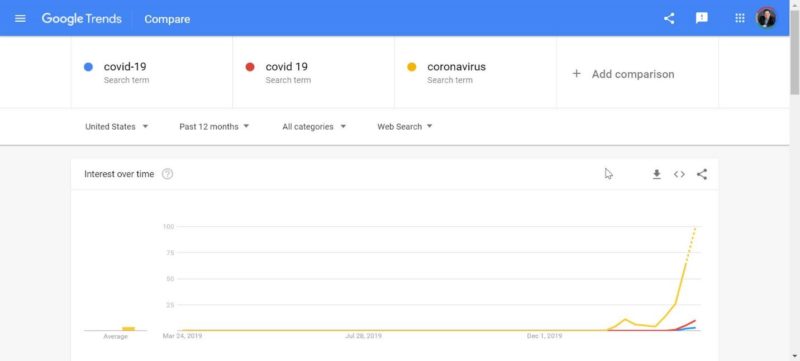Using SEO to help people find more info on Novel Coronavirus COVID-19
The global pandemic is also a lesson in good keyword research for publishers.
Who cares about SEO during a global pandemic? People are dying and all people want to read about is COVID-19 and what’s going on with the economy. Right?
Yes, in a sense. But it’s a shame because SEO did not stop being relevant when the virus appeared. And if you’re a publisher writing about the virus (which of course should be accurate and relevant), you could be missing out on traffic (and the opportunity to help more people who are looking for information on the disease) if you’re not using the words people are when they’re looking to understand what’s going on with this pandemic.
One of my friends who has a friend who is a conspiracy theorist told me a few weeks ago that coronavirus is not a new thing. That, in fact, it’s even referenced on the Clorox Wipes bottle! His mind was blown when he told me this and he was convinced at the time that it was evidence that the disease was created in a lab by the Chinese (not true).
A quick Google search on this brought me to the CDC COVID-19 FAQ page where I learned that Coronavirus is a type of viruses that includes the Common Cold, and that when most people say “coronavirus” they really mean the novel Coronavirus discovered in 2019, shortened to COVID-19.
I explained this to him the next day but my friend is not alone in thinking that the term “coronavirus” is synonymous with COVID-19. When searching for information on it, more people search for “coronavirus” than the novel coronavirus, COVID-19. It’s not even close:

What this means for publishers writing about Coronavirus COVID-19 is that they should add both terms to headlines and trackers and stories if they want to get it to most people.
Take Bing, for example. They have a great Coronavirus COVID-19 tracker, and they rank #1 in Google for [covid 19 tracker] because they have the exact match query in the title tag:

They probably get a fair amount of traffic from the #1 result on that query, but not nearly as much as they would for “coronavirus tracker” according to Google Trends.
And they’re not even on the first page for that one:

So what should a publisher do if they want to appear for both COVID-19 tracker and Coronavirus tracker? Use both terms, like the number one result for “coronavirus tracker” does above. When referencing COVID-19, say “the novel coronavirus, COVID-19” once or twice in order to explain how the two terms are related. Right now people use the terms interchangeably, so it makes sense to educate your reader when they come to your page from search, and doing so will connect your content with more readers in the process.
SEOs are great, but they are not exactly heroes like healthcare professionals and service workers who risk their health and well-being to save people’s lives. But if you’re a journalist or health worker who is desperately trying to reach as many people online as you can about this disease, don’t forget to use basic SEO principles like this to get the right information out to as many relevant people as possible.
Contributing authors are invited to create content for Search Engine Land and are chosen for their expertise and contribution to the search community. Our contributors work under the oversight of the editorial staff and contributions are checked for quality and relevance to our readers. The opinions they express are their own.
Related stories
New on Search Engine Land